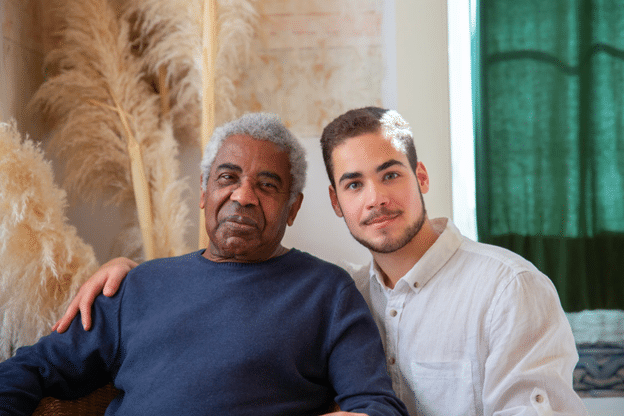Being a senior caregiver is a rewarding job, but it can also be challenging, both physically and emotionally. It takes a lot of time, effort, and dedication to provide quality care while also balancing your own work and personal life. Long-term stress can take a toll on your overall well-being.

Tap At-Home Services
Hiring at-home services (home health aides, meal delivery, and housekeeping services) can lighten the load of caring for seniors. These services can be tailored to fit your needs and budget. Take a look at your options online, as these services vary around the country.
“Ordering in” provides another benefit. Often those who deliver Meals on Wheels provide social contact that’s good for seniors’ mental health.
Don’t assume that hiring help is just for people with loads of money. Depending on which state you live in, you may find that state support makes home health care affordable, even for those of modest means. Here’s a state-by-state breakdown of benefits. For a complete list of services, download this brochure. It will point you to programs that might be just what you or your senior needs.
But isn’t hiring all these services going to break the bank? No, it’s not. So called “Cash and counseling programs” originally began as a pilot program to assist Medicaid-eligible seniors. This pilot program has now expanded to every state, with each state calling it something different. Services are different, too. However, the basic idea is to provide money so that seniors can hire and pay their own caregivers.
Ask for Help
Often, caring for a senior falls primarily on one person, often a middle-aged daughter. However, in many cases, the caregiver can call on family members for extra help. A family member who lives far away might be able to fly in for a week or more. If clothing is needed, they can shop and send a care package by mail. Those who live close can drive mom or dad to doctors’ appointments or run errands.
But why don’t other people see what needs to be done and do it? Oftentimes, people who aren’t involved on a day-to-day basis hang back. They don’t want to step on the caregiver’s toes. Also, they don’t know what, exactly, needs to be done. So, rather than complain that the burden is all on you, figure out specific, actionable tasks. Delegate! It can make a big difference in your mental health.
Ask About Job Flexibility
If your job requires you to work outside the home, then consider asking your boss about flexible work hours or working remotely. In many cases, this will allow you to take care of your loved one during the day without you having to sacrifice your job in the process. Additionally, some employers offer paid leave for caregivers.
According to the website Easy Living, a Florida company that specializes in senior care,
- An estimated 66% of caregivers are female.
- The average caregiver is a 49-year-old woman who works outside the home and provides 20 hours per week of unpaid care to her mother.
- Although men also provide assistance, female caregivers may spend as much as 50% more time providing care than male caregivers.
Taking on the role of caregiver means that a working adult risks being short of money when they enter their own senior years. For that reason, it’s important that caregivers look into the possibility of getting paid.
Don’t Work for Free
If you get paid, then you contribute to your own Social Security account.
In California, New York, Washington, the District of Columbia, New Jersey, and Rhode Island, caregivers taking time off work can receive up to between 60% and 70% of their lost wages up to a maximum of $1,620 per week (as of January 2023), for up to 8 weeks during a 12-month period. The benefit amount is determined by an applicants’ highest quarter of earnings during the previous 12 months.
If your family member qualifies for Medicaid, then in seven states – New York, Nevada, Missouri, Pennsylvania, Arizona, and Indiana – a friend or family member can get paid to be a caregiver. If the senior being cared for is a veteran, then the options for care are even greater. There’s no time limit on getting paid. Many veterans have such severe injuries that they must be cared for 24/7. That care can last years.
Younger Caregivers
What can happen is that caregiving goes on far longer than anticipated. The middle-aged daughter might realize she needs to go back to work because she can see her own retirement just over the horizon. Perhaps, there’s a young person in the family who could step in.
A young person – a grandchild or grand-niece or grand-nephew – might volunteer to help out for what they envision as a short-term good deed. Or, they might be forced to become a caregiver because there’s simply no one else. (See the story of Jacquelyn Revere below.)
In some ways, moving in with an elderly relative solves problems for both generations. The young person gets room and board in exchange for light housekeeping and companionship. They may even get paid, something that’s good for self-esteem. A stint of family caregiving can also allow people in their twenties time to regroup and decide on long-term goals.
Plan for Online Learning
If the younger generation opts in and becomes a family caregiver, then going back to school online is an excellent way to increase their knowledge base. If the demands of caregiving aren’t too heavy, the responsibility involved in caring for an elder can advance a young person’s career. If the young person was let go due to downsizing, had a job with on-again, off-again shifts, or thought their job wasn’t going anywhere, then becoming a caregiver could be a perfect fit.
That’s because caregiving often means many empty hours during the day. (If the older person has dementia, that’s not the case. There are no empty hours.)
Depending on the needs of the senior, however, a younger caregiver might be able to sign up for online courses. There are many courses, such as those offered through Coursera, that offer degrees and certifications in IT, business, healthcare, and more. These online programs could open up opportunities in the future. If a young person takes on a caregiving role, knowing that they have career options can help lighten the load and reduce stress.
Have a CV Handy
Whether you’re a middle-aged woman taking time out to help her mom or a younger person, your time as a caregiver doesn’t have to show up as a blank space on your resume. And, eventually, you’ll be ready to make the transition from caregiver back into the workforce.
As a caregiver, you’ve proven you can handle responsibility. Having an updated CV will showcase all of your skills, qualifications, and experiences so you can impress potential employers. Build a stunning curriculum vitae with an online builder. The best part? Creating a professional-looking document is easy with a CV template, which you can customize with your favorite copy, colors, and images.
Find Support
Being a senior caregiver can be overwhelming, even for the most experienced individual. To combat burnout, join support groups and forums where you can touch base with other caregivers. They understand what you’re going through. They’re your cheering section.
This is especially beneficial if your caregiving duties make it impossible for you to leave the house. Listen to this NPR story about Jacquelyn Revere, a 29-year-old woman who became a #dementia TikTok celebrity. Jacquelyn’s mother and grandmother both had Alzheimer’s, and it was up to her to keep the family afloat. Just imagine the Herculean effort it took to care for two women with dementia at the same time!
Meditate for Me-Time
As you look for support, remember to schedule alone-time. Even if you’re housebound, you can take a mental break by meditating. Meditating has been shown to reduce stress levels and improve overall mental health. Releasing stress is essential when taking care of someone else. Taking just 15 minutes out of each day for yourself can make all the difference when it comes to staying focused and energized.
Being a senior caregiver is no easy task, but there are resources you can tap into. They make the job easier. And, like Jacquelyn Revere, you may discover that caregiving helps you redefine your life’s purpose.
Here, Family Caregiver Support has compiled a list of tips that will help make your daily responsibilities easier. Check out inspiring caregiver stories.


